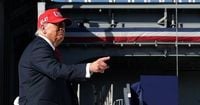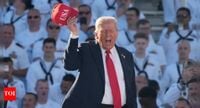On Sunday, October 5, 2025, President Donald Trump stood before a crowd of Navy sailors at Naval Station Norfolk, Virginia, and declared that U.S. military strikes on small boats near Venezuela had been so successful that, in his words, "there are no boats" left in the area. The announcement punctuated weeks of escalating military operations in the southern Caribbean, with the U.S. Navy targeting vessels Washington alleges were trafficking drugs to American shores.
"We’re stopping drugs at a level that nobody’s ever seen," Trump said, according to Reuters. He didn’t stop there. With characteristic bravado, he added, "We’re so good at it that there are no boats. In fact, even fishing boats – nobody wants to go into the water anymore. Sorry to tell you that. We just can’t find any." The President also warned traffickers that, with the maritime route allegedly closed, "they’ll be forced to go by land. And let me tell you right now, that’s not going to work out well for them either."
Since September, U.S. forces have destroyed at least four boats in international waters near Venezuela, according to multiple U.S. officials cited by France 24 and BORNA. These operations, which the White House says are aimed at stopping the flow of fentanyl and other drugs into the United States, have reportedly killed at least 21 people so far. The most recent strike, which Trump referenced in his Sunday remarks, occurred on Saturday, October 4, 2025, though the Pentagon's last publicly announced operation was on Friday, October 3.
Video footage released by the Pentagon and shared widely on social media showed an open speedboat suddenly engulfed in smoke and flames—a stark visual of the U.S. military’s new approach to drug interdiction at sea. U.S. Defense Secretary Pete Hegseth, speaking to Fox News, confirmed he had "every authorisation needed" to conduct these strikes and claimed that intelligence "without a doubt" confirmed the targeted vessels were carrying substantial amounts of narcotics destined for American markets.
"These strikes will continue until the attacks on the American people are over!!!!" Hegseth posted on X, underscoring the administration’s hardline stance. However, he did not provide specific evidence regarding the amount or type of drugs aboard the destroyed vessels, nor did he release proof that those killed were, in fact, drug smugglers or "narco-terrorists" as described by U.S. officials.
President Trump, for his part, has repeatedly framed these operations as both a matter of national security and a moral imperative. At the Navy’s 250th anniversary ceremony in Norfolk, he told the assembled crowd, "Every one of those boats is responsible for the death of 25,000 American people and the destruction of families. So when you think of it that way, what we are doing is actually an act of kindness." According to BORNA, Trump credited the strikes with eliminating a key sea route for drug trafficking and suggested the crackdown had made the waters so dangerous that even fishing boats were staying away.
The Trump administration has cited a range of legal justifications for the strikes, including the U.S. Constitution, war powers, the designation of drug cartels as "foreign terrorist organisations," the right to self-defense, and international law governing unlawful combatants. On Thursday, October 2, Trump notified Congress that his administration had determined members of drug cartels were "unlawful combatants" and that the U.S. was engaged in a "non-international armed conflict" with them, as reported by Al Jazeera.
Yet, not everyone is convinced by these arguments. Legal experts and opposition lawmakers have raised serious questions about the legality of using lethal force in foreign or international waters against suspects who have not been intercepted or questioned. Critics argue that such actions bypass due process, violate law enforcement norms, and lack a clear legal foundation under both U.S. and international law. The growing chorus of concern has only intensified as the death toll from the strikes has climbed.
International reaction has been swift and, in some quarters, severe. Russia, a long-time ally of Venezuela, condemned the U.S. strikes, particularly the one on October 3, which killed four people in international waters off Venezuela’s coast. Russian Foreign Minister Sergey Lavrov, in a phone call with his Venezuelan counterpart Yvan Gil on October 5, expressed "serious concern about Washington’s escalating actions in the Caribbean Sea that are fraught with far-reaching consequences for the region," according to a statement from Russia’s Ministry of Foreign Affairs. Lavrov also reaffirmed Russia’s "full support and solidarity with the leadership and people of Venezuela in the current context."
Venezuelan President Nicolas Maduro has vigorously rejected U.S. allegations that his government is complicit in drug trafficking. He accused Washington of using the fight against cartels as a pretext to topple his government and seize Venezuela’s natural resources. In a video message released after Trump’s latest remarks, Maduro declared, "Our people have never and will never be afraid to defend their right to live and be free. We will be ready to face any scenario." Venezuela has sought diplomatic support from abroad, with Foreign Minister Yvan Gil sending a letter to Pope Leo XIV requesting assistance in "consolidating peace in Venezuela," as reported by Reuters.
Venezuelan Defence Minister General Vladimir Padrino has also condemned the U.S. actions, describing the strikes as "a vulgarity, a provocation, a threat to the security of the nation." The Venezuelan government maintains that it has "eliminated all major trafficking networks and vanquished prominent gangs," and insists that the U.S. is using the drug war as a smokescreen for regime change.
As the U.S. military build-up continues in the Caribbean, the region finds itself on edge. The deployment of guided missile destroyers such as the USS Sampson near the Panama Canal, as reported by France 24, has only heightened tensions. While the U.S. claims success in halting maritime drug trafficking, the future of the campaign—and its potential expansion onto land routes—remains uncertain. Trump’s warning that "phase two" may soon begin has left both traffickers and regional governments bracing for what comes next.
With at least 21 people dead, four boats destroyed, and the specter of further escalation looming, the U.S. campaign against alleged "narco-terrorists" off Venezuela’s coast has thrust the Caribbean into the global spotlight. The legality, effectiveness, and broader consequences of this new front in the war on drugs are likely to remain hotly debated in the weeks ahead.


